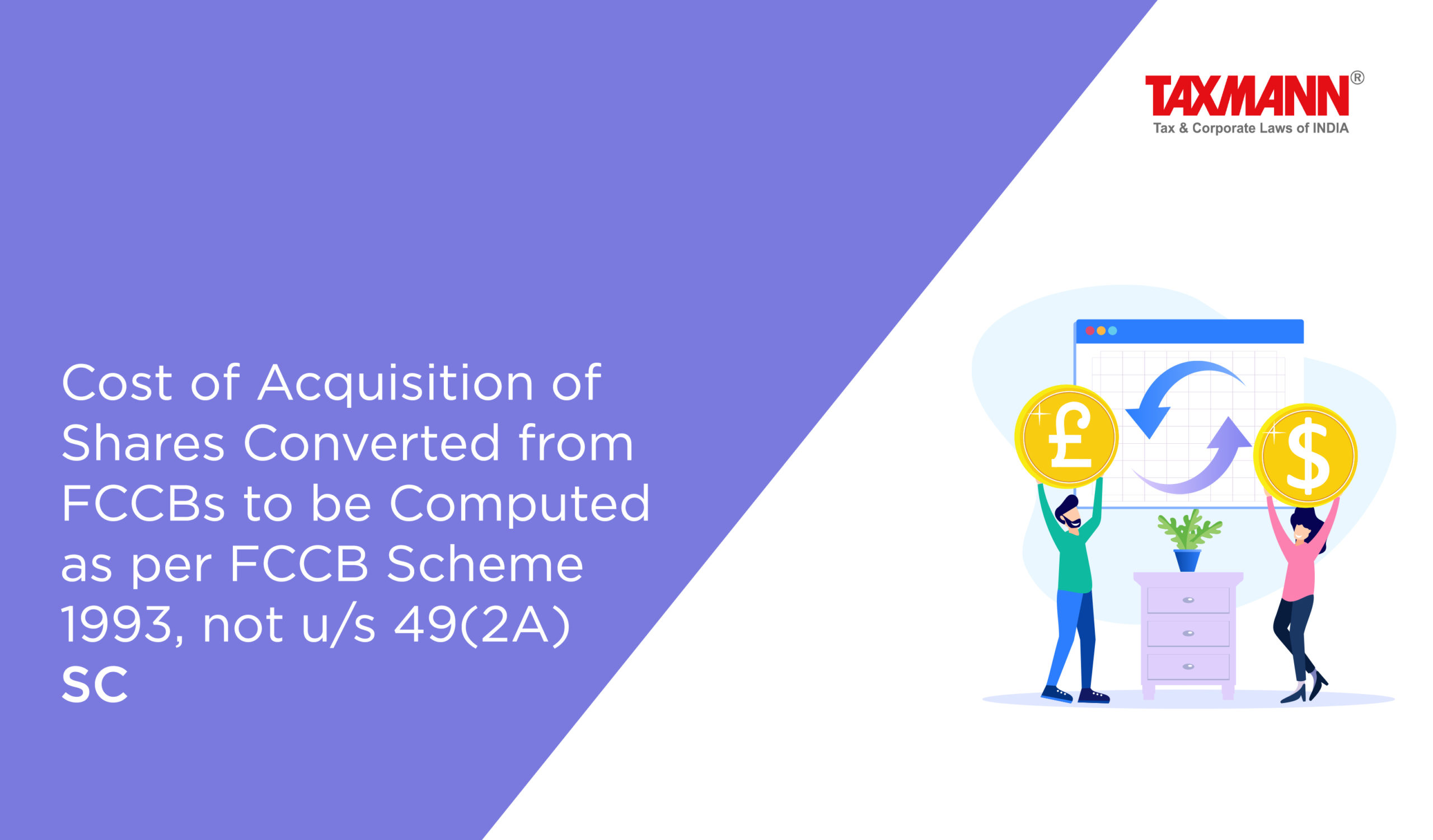Cost of Acquisition of Shares Converted from FCCBs to be Computed as per FCCB Scheme 1993, not u/s 49(2A) | SC
- News|Blog|Income Tax|
- 3 Min Read
- By Taxmann
- |
- Last Updated on 9 August, 2023

Case Details: Commissioner of Income-tax (International Taxation)-3, Mumbai v. Kingfisher Capital Clo Ltd. - [2023] 153 taxmann.com 163 (SC)
Judiciary and Counsel Details
-
- S. Ravindra Bhat & Aravind Kumar, JJ.
- K.M. Natraj, A.S.G. Shashank Bajpai, Nalin Kohli, Rupesh Kumar, Sansriti Pathak, Alka Agarawal, Advs. & Raj Bahadur Yadav, AOR for the Petitioner.
- T. Suryanarayana, Sr. Adv. Ms Yugandhara Pawar Jha, Ms Manasa Ananthan, Ms Tanmayee Rajkumar, Ms Lavanya Dhawan, Ritik Gupta, Advs. & Kunal Verma, AOR for the Respondent.
Facts of the Case
Assessee, a Cayman Island entity, purchased Foreign Currency Convertible Bonds (FCCBs) from a non-resident as per the scheme notified by the Central Government in 1993. During the year under consideration, assessee converted such bonds into equity shares and sold a part of such shares on stock exchange. To compute the quantum of capital gains, the assessee relied on clause 7(4) of the FCCB scheme and adopted the closing price of equity shares on the date of conversion of FCCBs into shares as its cost of acquisition. Accordingly, the computed gains were offered to tax as short-term capital gains.
In the assessment proceedings, the Assessing Officer (AO) held that the cost of acquisition must be computed in accordance with section 49(2A). Assessee filed write before the Bombay High Court.
The High Court held that Clause 7 of the scheme specified the cost of acquisition for conversion of FCCBs would be conversion price determined based on the price of the shares at the Bombay Stock Exchange or the National Stock Exchange on the date of the conversion of FCCBs into shares.
The matter reached the Supreme Court.
Supreme Court Held
The Supreme Court held that AO’s contention was with respect to the interpretation of Section 47 (xa), which was introduced through an amendment from the Finance Act, 2008, with effect from 01.10.2008. It was urged that a combined reading of that provision with Section 115AC ought to have led to a correct conclusion that the date of acquisition of the bonds by the assessee was the determinative time for its valuation.
However, the court upheld the findings of the High Court that the assessee was right in his contention that the AO fell in clear error in taking assistance from the amendments made by the Finance Act, 2008. The authority was not right in holding that the cost of acquisition of the shares as per clause 7(4) of the FCCB Scheme is not tenable.
AO attempted to read the provisions of the Income-tax Act introduced with effect from 1-4-2008 in relation to Foreign Currency Exchangeable Bond Scheme, 2008 and apply it to the FCCB Scheme of 1993. This is not correct.
It was evident that any scheme prior thereto and particularly the FCCB Scheme notified by the Central Government in 1993 and applicable with effect from 1st April 1992 and enabling the computation of cost of acquisition, in terms thereof, was held to be unaffected.
The bonds issued in the instant case did not answer the description of the Foreign Currency Exchangeable Bond Scheme, 2008. They conformed with the earlier scheme relating to the Foreign Exchange Convertible Bonds Scheme 1993. The distinction between the two schemes is that one relates to the issuance of Exchange Convertible Bonds, whereas the other relates to Foreign Currency Exchangeable Bonds.
Thus, there was no infirmity with the Bombay High Court’s reasoning; accordingly, the revenue’s appeal was dismissed.
Disclaimer: The content/information published on the website is only for general information of the user and shall not be construed as legal advice. While the Taxmann has exercised reasonable efforts to ensure the veracity of information/content published, Taxmann shall be under no liability in any manner whatsoever for incorrect information, if any.

Taxmann Publications has a dedicated in-house Research & Editorial Team. This team consists of a team of Chartered Accountants, Company Secretaries, and Lawyers. This team works under the guidance and supervision of editor-in-chief Mr Rakesh Bhargava.
The Research and Editorial Team is responsible for developing reliable and accurate content for the readers. The team follows the six-sigma approach to achieve the benchmark of zero error in its publications and research platforms. The team ensures that the following publication guidelines are thoroughly followed while developing the content:
- The statutory material is obtained only from the authorized and reliable sources
- All the latest developments in the judicial and legislative fields are covered
- Prepare the analytical write-ups on current, controversial, and important issues to help the readers to understand the concept and its implications
- Every content published by Taxmann is complete, accurate and lucid
- All evidence-based statements are supported with proper reference to Section, Circular No., Notification No. or citations
- The golden rules of grammar, style and consistency are thoroughly followed
- Font and size that’s easy to read and remain consistent across all imprint and digital publications are applied



 CA | CS | CMA
CA | CS | CMA
